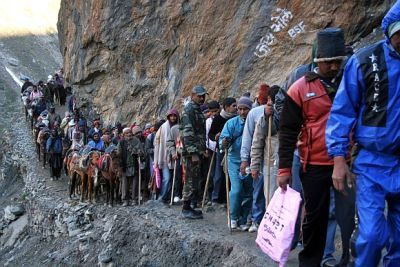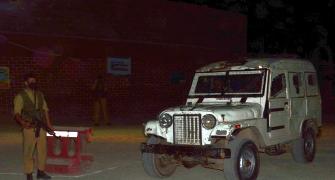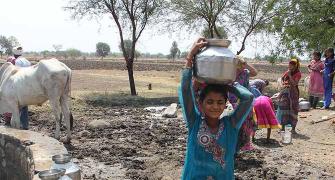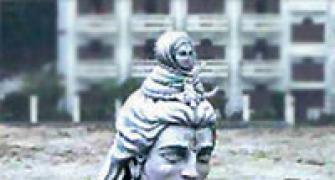
The National Green Tribunal on Thursday clarified that it has not imposed any restriction including on chanting of mantras and singing of bhajans inside the Amarnath cave shrine in south Kashmir Himalayas.
Following protests over its decision, the green panel said that it has neither intended nor declared the entire area as a “silence zone”.
It said that the only restriction imposed was that any devotee or any individual should maintain silence while standing in front of the “Amarnath Ji Maha Shivling”, a natural formation in the cave.
A bench headed by NGT chairperson Justice Swatanter Kumar said the restriction was not applicable to any other part including the main stairs leading to the holy cave.
The tribunal also clarified that on the last stairs approximately 30 steps leading to the holy cave, it should be ensured that no pilgrim carries any material as it is already
the practice of the Board.
There was no restriction of any kind below the stairs, it added.
“The one way queue of visitors/pilgrim will be maintained at the shrine. These directions would be complied with by all concerned.
“This direction in our considered view is required to maintain the sanctity and pristine condition of the holy cave on the one hand while on the other to ensure that there are no adverse impacts of noise, heat, vibrations etc upon the Amarnath Ji Maha Shivling, so that the pilgrims coming in the later part of the limited period available to the pilgrimage are also able to have the darshan of the Amarnath Ji Maha Shivling,” the bench said.
The NGT directed its registry to send the copy of this order to the secretary of the ministry of the environment and forests, chief secretary of Jammu and Kashmir government, CEO of the Amarnath Shrine Board and the local authorities of that area.
“From the end point of stairs and area of the holy cave only shall be treated as silence zone,” the NGT had said in its order on Wednesday.
The tribunal had said the Amarnath Shrine Board should ensure that proper infrastructural facilities are provided to pilgrims so that they are not deprived of a clear ‘darshan’, and the ecology of the area is maintained.
“At the frisking point there shall be provided a space for storage for articles. Nobody would be permitted to carry any article mobile etc. beyond frisking point which is also the practice followed in other religious places,” it had said.
It had earlier said that declaring the area around the Amarnath cave shrine a “silence zone” would be helpful in preventing avalanches and maintaining its pristine nature.
The Amarnath cave shrine is considered one of the major holy shrines by Hindus. The cave itself is covered with snow most of the year barring a short period of time in summer when it is opened for pilgrims.
NGT’s clarification on Thursday followed protests by the Vishwa Hindu Parishad, a Hindu right-wing outfit, which had termed its earlier order as a “Tughlaki fatwa” (whimsical whip). It had said that Hindus were not responsible for every ecological problem on earth.
However, environment activist Gauri Maulekhi, on whose plea the directions were passed, had welcomed the order and termed it “good and progressive”.
“The Amarnath cave is located in a delicate ecosystem. The directions would make the Amarnath Yatra safe and convenient for devotees. This would protect the shrine from degradation and ensure it is protected for coming generations. It is indeed a very good and progressive direction,” Maulekhi had said on Wednesday.









